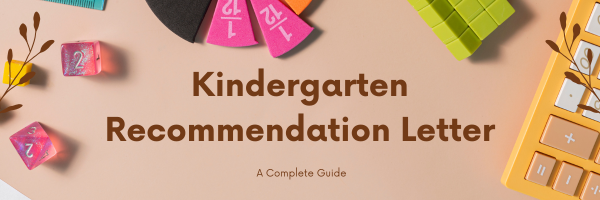
When it comes to early education, a Recommendation Letter for Kindergarten Student might seem like a small task. However, for parents and schools, it holds immense value. It’s more than just a formality—it’s a chance to capture a child’s unique qualities, their readiness for school, and their potential to thrive in a new learning environment.
Whether you’re a teacher, daycare provider, or mentor, your words in this Recommendation Letter for Kindergarten Student can shape the child’s first big step into formal education. This guide will walk you through how to write a heartfelt and effective Recommendation Letter for Kindergarten Student, complete with tips and a detailed sample.
Why Does a Kindergarten Recommendation Letter Matter?
A recommendation letter for a kindergarten student is an important document, even in the early stages of education. Here’s why it matters:
- Supports School Admissions:
Many schools require a recommendation letter to understand a child’s personality, social skills, and readiness for kindergarten. - Builds a Strong First Impression:
A thoughtful letter highlights the child’s unique strengths, setting them apart from others. - Reflects Emotional and Social Development:
At this age, emotional intelligence, curiosity, and teamwork are just as important as academic skills.
How to Write a Recommendation Letter for Kindergarten Student
Crafting a recommendation letter requires both warmth and professionalism. Here’s how to structure it:
1. Start with an Introduction
Begin the letter by introducing yourself, your position, and how you know the child. For example:
“I have had the pleasure of teaching [Child’s Name] at [School/Daycare Name] for [specific time period], and during this time, I have watched them grow into a bright and curious individual.”
2. Highlight the Child’s Strengths
Discuss the child’s key skills and attributes. At this stage, it’s not about academics alone but their creativity, curiosity, and willingness to learn.
3. Use Specific Examples
Support your points with real-life anecdotes. For instance:
“[Child’s Name] amazed me during our art sessions by creating thoughtful and detailed drawings, often explaining the stories behind them with enthusiasm.”
4. Emphasize Personal and Social Qualities
Kindergarten is a social experience, so it’s important to highlight the child’s ability to collaborate and communicate with others.
5. Conclude with a Strong Endorsement
End with a statement of confidence in the child’s ability to thrive in kindergarten. Offer your contact details for any further inquiries.
Key Elements to Include in the Letter
1.Relationship with the Child:
Clearly state how you know the child (e.g., as their teacher, daycare provider, or tutor).
2.Developmental Milestones:
Highlight the child’s growth in areas like language, motor skills, or problem-solving abilities.
3.Social Skills:
Mention their ability to work with peers, follow instructions, or show empathy towards others.
4.Curiosity and Creativity:
Schools love to hear about a child’s eagerness to explore, ask questions, and express themselves creatively.
Sample Recommendation Letter for Kindergarten Student
Here’s a sample letter to help you get started:
[Your Name]
[Your Title/Position]
[School/Daycare Name]
[Date]
To Whom It May Concern,
It is my absolute pleasure to write this letter of recommendation for [Child’s Full Name]. I have been fortunate to teach and nurture [Child’s First Name] during their time at [School/Daycare Name] over the past [specific time period], and I am continually impressed by their growth, enthusiasm, and curiosity.
[Child’s First Name] is a bright and inquisitive learner who thrives in hands-on activities. Whether it’s engaging in storytelling, building creative projects, or exploring science activities, [Child’s First Name] approaches every task with a sense of wonder and determination. One particular moment that stood out was when [specific example, e.g., they built an imaginative city using blocks and eagerly explained the purpose of each structure].
Socially, [Child’s First Name] is a kind-hearted and empathetic child who enjoys helping others. They often go out of their way to include classmates in games and group activities, ensuring everyone feels welcome. Their ability to work collaboratively and communicate effectively makes them a natural leader in the classroom.
It is without hesitation that I recommend [Child’s First Name] for admission to [Kindergarten Program Name]. I am confident that their enthusiasm for learning, compassionate nature, and creative mind will make them a valuable addition to your school community. Please feel free to contact me at [Your Email] or [Your Phone Number] if you require additional information.
Sincerely,
[Your Name]
[Your Position]
Tips for Making the Letter Memorable
1.Personalize It:
Avoid generic statements. Tailor the letter to highlight the child’s specific achievements and qualities.
2.Keep It Warm and Positive:
Use an encouraging tone that reflects the child’s potential and readiness for school.
3.Balance Soft Skills and Strengths:
Focus equally on social-emotional skills and developmental progress.
4.Be Concise Yet Detailed:
Aim for 300–400 words. Keep it short enough to hold attention but detailed enough to make an impression.
Common Mistakes to Avoid
1.Being Too Generic:
Avoid phrases like “the child is nice.” Instead, explain why they’re exceptional with examples.
2.Overloading with Academics:
At this age, social, emotional, and creative qualities matter more than academic achievements.
3.Lacking Enthusiasm:
Make sure your tone reflects excitement and positivity about the child’s potential.
Why Your Role as a Recommender Matters
As someone who has spent time with the child, you’re uniquely positioned to showcase their personality and strengths. Your letter can help schools understand not only the child’s abilities but also the values they bring to the classroom.
Final Thoughts
Writing a recommendation letter for a kindergarten student is about more than highlighting milestones; it’s about capturing their individuality and potential. With the tips and sample provided in this guide, you’ll be able to craft a heartfelt and impactful letter that leaves a lasting impression.
Remember, your words are a reflection of the child’s character and readiness to take on this exciting new chapter in their life. Take your time, add personal anecdotes, and make the letter as genuine as possible.
If this guide helped you, feel free to share it with other educators, daycare providers, or parents looking to create meaningful recommendation letters!
